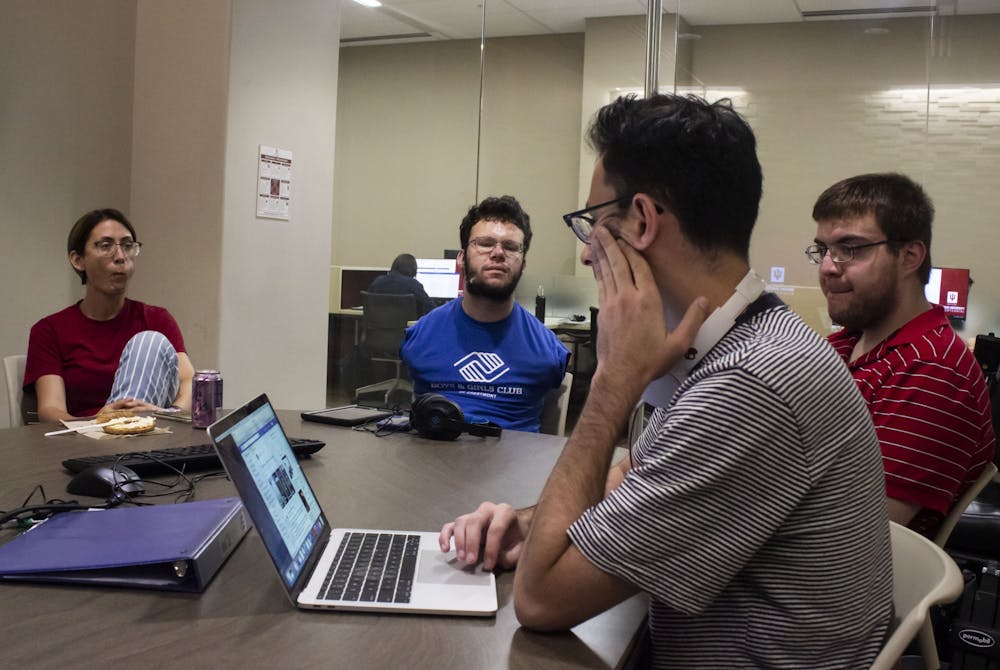Distractions can be numerous while learning online, whether they be noisy environments, long hours of screen time or constant tempting phone notifications. While these obstacles to attention are widespread for students in the pandemic, the neurodiverse community at IU has especially struggled to focus in their virtual classes.
“Neurodiverse” refers to individuals with neurological conditions such as autism, dyslexia or attention deficit hyperactivity disorder. An estimated 20% to 22% of the world population can be classified as neurodiverse, according to the Neurodiversity Coalition on IU’s website.The term neurodiversity is meant to reframe these medical conditions from problems that need to be fixed to characteristics that should be celebrated.
Related: [Softening stigma]
Abe Shapiro, a 2020 graduate, was diagnosed with Asperger's syndrome at a young age. Years later he came to IU, where he noticed how individuals on the autism spectrum struggled with communication and social situations.
“I wanted to leave campus with the belief that I had done something to make life better for people on the spectrum,” he said.
Shapiro said he started the Neurodiversity Coalition in 2019 to support and educate IU’s neurodiverse community and inform the public on what neurodiversity means.
“I wanted to allow another voice to be heard,” he said. “And neurodiversity coalition was really how it started.”
The need to support people who are neurodiverse is especially important in the anxieties of the pandemic, as classes shift online and the number of positive cases rise.
“You think about the general population and what everyone's going through, and you take people with neurodiversity and you times that by two,” Neurodiversity Coalition co-President Benjamin Foley said.
Neurodiverse students often face issues with prioritization and time management, and with in-person classes severely limited, these issues have been exacerbated, Foley said.
Online classes do not have the face-to-face accountability of in-person learning, Foley said. Prioritizing the work of online classes can become a challenge because many neurodiverse students have issues with executive functioning, which involves skills such as time management and organization.
When IU sent students home at the beginning of the pandemic, sophomore Jayda Payne moved back to her home in Indianapolis. She was living with her five brothers and four sisters while completing her online classes.
She said this situation was especially challenging as a neurodiverse student because her home life presented a gauntlet of distractions that pulled at her focus.
“I have ADHD, and that was also a big deal for me, especially with COVID-19 and everything because I do not work well online at all,” Payne said.
Payne faces similar challenges this fall despite living in her own apartment. She said it was more difficult to take finals online because it was hard to perform outside of a classroom, an environment her brain associated with focus.
“I was doing my test, but my brain could not stay focused for three hours to finish the test,” she said.
Freshman Brenna Henning, who is on the autism spectrum, said she experiences issues with time management and prioritization during virtual classes.
“With classes online, you need to be able to be very organized,” Henning said. “But it's hard when you have issues with executive functions.”
Related: [OPINION: Neurodiversity in women and nonbinary people should not be overlooked]
IU Spokesperson Chuck Carney said IU provides academic support services to hundreds of neurodiverse students through the Office of Disability Services for Students, even if not specifically under the term “neurodiversity.”
“Whether or not the term was here, we've all always been working with people who have particular needs,” Carney said.
The university works with each student on a case-by-case basis, providing assistive technology in the form of hardware, software, alternative format books and classroom materials, according to the Division of Student Affairs website. Counseling, extensions to assignment deadlines, flexibility with class attendance and “distraction reduced or private” environments for tests are also available.
Hennings received additional time for testing and communicated with her professors, but still struggles to manage her time.
“When you're stuck in your dorm or your home situations, hours can feel like just minutes,” she said.
For Payne, in person classes meant she was able to visit a professor during office hours. She said the environment and presence of the instructor helped her focus. However, the pandemic caused office visits to shift online and introduced new issues with learning.
“She no longer had the same office hours, and it would always be some type of issue with the internet so I couldn’t even have office hours sometimes,” she said.
The university cannot address issues with distracting environments, but does its best to provide academic extensions and exceptions when possible, Carney said.
“We can't control where they are off campus,” Carney said. “But we can control how courses are delivered and when things are available.”
As the university works to coordinate classes and limit the spread of the coronavirus, there is no blanket solution to issues neurodiverse students face. Carney said professors were advised to work with individual students as necessary given the circumstances.
“Again, it goes down to the individual instructors and dealing with an individual student,” he said.




